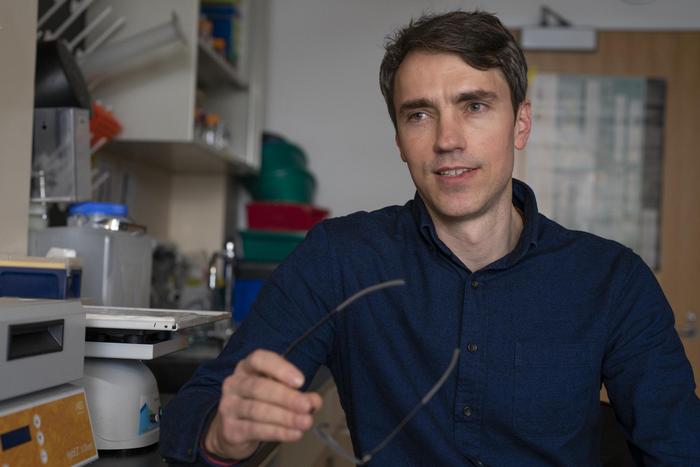An international team of scientists has identified nearly a dozen genes that contribute to calcium buildup in our coronary arteries that can lead to life-threatening coronary artery disease, a condition responsible for up to one in four deaths in the United States. Doctors may be able to target these genes with existing medications – or possibly even nutritional supplements – to slow or halt the disease’s progression.

Credit: Dan Addison | UVA Communications
An international team of scientists has identified nearly a dozen genes that contribute to calcium buildup in our coronary arteries that can lead to life-threatening coronary artery disease, a condition responsible for up to one in four deaths in the United States. Doctors may be able to target these genes with existing medications – or possibly even nutritional supplements – to slow or halt the disease’s progression.
“By sharing valuable genotype and phenotype datasets collected over many years, our team was able to uncover new genes that may foreshadow clinical coronary artery disease,” said researcher Clint L. Miller, PhD, of the University of Virginia School of Medicine’s Center for Public Health Genomics. “This is a critical first step in identifying the biological mechanisms to target for primary prevention of coronary artery disease.”
Coronary Artery Calcification
Even before people develop clinical atherosclerotic coronary artery disease, doctors can detect calcium buildup inside the walls of the coronary arteries using non-invasive computed tomography (CT) scans. This reliable measure of subclinical coronary atherosclerosis strongly predicts future cardiovascular events such as heart attacks or strokes, leading causes of death globally. This calcium accumulation is also linked to other age-related diseases, such as dementia, cancer, chronic kidney disease and even hip fractures.
Despite the known role of genetics in coronary calcium buildup, only a handful of contributing genes had been identified. So Miller and his collaborators were eager to identify new genetic factors that influence our risk for coronary calcium buildup.
They did this by analyzing data collected from more than 35,000 people of European and African ancestry around the world. This was the largest such “meta-analysis” yet conducted to understand the genetic basis of coronary artery calcification.
“Coronary artery calcification reflects the vessel’s accumulation of lifetime exposure to risk factors,” Miller said. “While previous studies from over a decade ago identified a handful of genes, it was clear that larger and more diverse studies would be necessary to begin to identify the pathways underlying coronary artery calcification.”
By combining several statistical analysis methods, the scientists identified more than 40 candidate genes at 11 different locations on our chromosomes linked to coronary artery calcification. Eight of these locations had not been previously connected to coronary calcification at all, and five were not yet reported for coronary artery disease. Genes at these locations play important roles in determining the mineral content of our bones and regulate key metabolic pathways in the formation of calcium deposits, among other functions.
One of the genes the scientists identified, ENPP1, is altered in rare forms of arterial calcification in infants. The researchers also identified genes in the adenosine signaling pathway, which is known to suppress arterial calcification.
To validate their findings, the scientists conducted gene queries and experimental studies in human coronary artery tissues and smooth muscle cells and demonstrated direct effects on calcification and related cellular processes.
Now that the researchers have revealed the genes’ roles in coronary artery calcification, scientists can work to develop drugs (or identify existing ones) that can target the genes or encoded proteins to modulate the calcification process. Some of the promising new targets may even be susceptible to dietary changes or nutrient supplementation, such as with Vitamin C or D.
While additional research needs to be done to determine how best to target these genes and affected pathways, Miller says the new discoveries could set the stage for improved risk stratification or early interventions that prevent the progression of coronary artery disease before it can take hold. That could be a game-changer for treating a disease responsible for more than 17 million deaths annually around the world.
“This interdisciplinary collaboration reveals the power of meta-analyses for an understudied and clinically relevant measurement,” said Miller, of UVA’s Departments of Biochemistry and Molecular Genetics and Public Health Sciences. “We look forward to continued progress in translating these preliminary findings to the clinic, and also to identifying additional genes that could generalize risk prediction across more diverse populations.”
Findings Published
The researchers have published their findings in the scientific journal Nature Genetics. The writing group of the research team consisted of Maryam Kavousi, Maxime M. Bos, Hanna J. Barnes, Christian L. Lino Cardenas, Doris Wong, Haojie Lu, Chani J. Hodonsky, Lennart P. L. Landsmeer, Lawrence F. Bielak, Patricia A. Peyser, Rajeev Malhotra, Sander W. van der Laan and Miller. A complete list of the team members and their disclosures is included in the paper. Miller disclosed that he has received support from biopharmaceutical company AstraZeneca for an unrelated project.
The research was supported by a wide array of generous funders, including National Institutes of Health (NIH) grants R01HL105756, R01HL148239, R01HL164577, R01HL142809, R01HL159514, F31HL156463, R01HL125863, R01HL146860, K01HL164687, R01HL163972, P30DK063491 and R01DK114183. A full list of funding sources is available in the paper.
To keep up with the latest medical research news from UVA, subscribe to the Making of Medicine blog.
DOI
10.1038/s41588-023-01518-4




